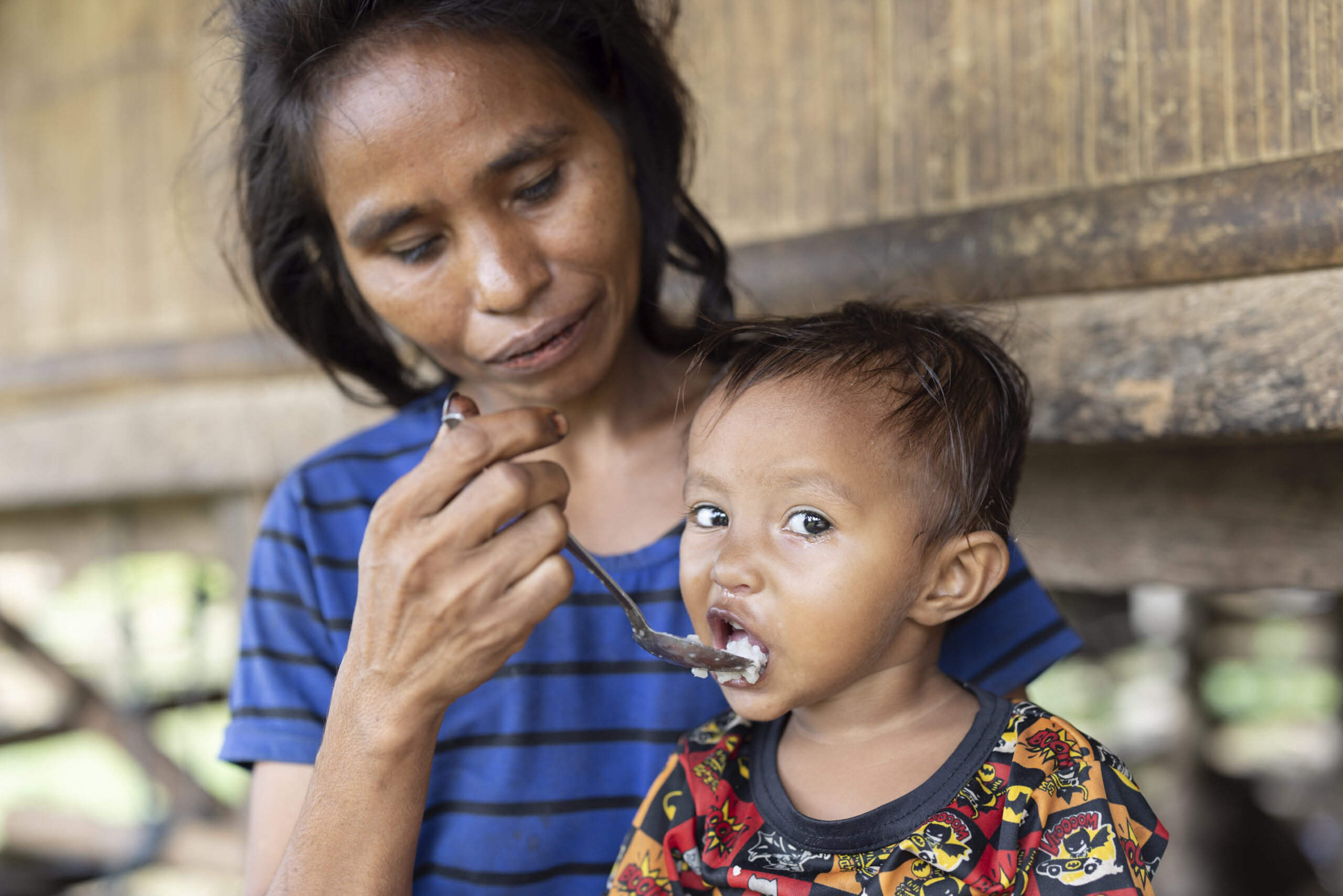When Siti* welcomed her seventh child, Amara*, her only daughter, she was filled with a mix of joy and deep fear. After suffering the heartbreaking loss of her stillborn baby before Amara, she feared history might repeat itself. Would Amara survive?
Siti and her husband, Agus*, live in a remote village on the island of Sumba, in East Nusa Tenggara Province, Indonesia. They grow a variety of crops – rice, mangoes, bananas, corn, cassava and taro root –to sustain their family. On good days, when the harvest is plentiful, there is a little extra to sell. Siti also weaves traditional cotton cloth to contribute to the family’s income.
From the start, Amara was a fragile baby, but her health began to deteriorate when Siti weaned her at six months and introduced solid foods, like rice and bananas. By the time Amara turned 10 months old, she was diagnosed with moderate acute malnutrition during a routine health check-up.
“Amara was so sick. She was having diarrhea. She had no energy. She was very thin. She was malnourished because I could not afford to buy good food for her,” Siti recalls. “I felt hopeless. At that time, I was hoping Amara would survive. Another child in the village had just died from malnutrition.”
After Amara’s diagnosis, a facilitator from ChildFund’s local partner organisation, Sumba Integrated Development, reached out to Siti. Through this partnership, Siti attended ChildFund’s responsive parenting classes. Here, she learned how to improve sanitation and hygiene at home, the vital importance of play and communication, and how to prepare nourishing meals from the foods grown in her own garden. Moringa leaves, which grow plentifully in the village, have become a key ingredient in her cooking.

Through the program, local facilitators also helped Siti navigate government services, allowing her to access a small stipend for nutritious food. Many families miss out on this support due to lack of awareness or difficulty with the paperwork. With this extra income, Siti prioritises buying fish and eggs for Amara when she can. Amara’s progress is closely monitored at the monthly ChildFund-supported parenting sessions. Although her weight has improved, she is still not fully recovered from the devastating effects of malnutrition.
“I want to continue to go to these parenting classes until Amara grows up,” says Siti. “Amara looks so much happier than my older children. I wish I had that knowledge earlier in life.”
Understanding Malnutrition and Undernutrition
The terms “malnutrition” and “undernutrition” are often used interchangeably, but they refer to different things. According to the World Health Organization (WHO), malnutrition is an umbrella term that refers to deficiencies, excesses or imbalances in a person’s intake of energy and/or nutrients. In fact, it encompasses both undernutrition and overnutrition. Here’s what each one means:
What is Malnutrition?
Malnutrition refers to a situation where a person’s diet is either lacking in essential nutrients, contains too much of certain foods, or is imbalanced in some way. It can result in both undernutrition (not getting enough nutrients) and overnutrition (getting too many nutrients, often in the form of excess calories).
What is Undernutrition?
Undernutrition is a type of malnutrition, specifically referring to a deficiency in calories, protein, and/or essential vitamins and minerals. People who are undernourished don’t get enough of the nutrients they need to stay healthy and grow properly.
There are a few key signs of undernutrition:
- Stunting: When children don’t grow tall enough for their age due to a lack of nutrients.
- Wasting: When someone’s weight is too low for their height, often due to severe lack of food or illness.
- Underweight: When a person’s weight is too low for their age or height.
- Micronutrient Deficiencies: A lack of essential vitamins and minerals, such as vitamin A or iron, which can lead to serious health issues.
Undernutrition can result from various factors like poverty, limited access to healthy food or illness. It’s a global issue that affects millions, particularly in low-income countries.
Why It Matters
Undernutrition weakens the immune system, stunts growth and can lead to developmental delays in children. It also increases the risk of diseases and even death in severe cases. By understanding the difference between malnutrition and undernutrition, we can better address the causes and work toward a healthier future for everyone, including kids like Amara.

The Broader Impact of Malnutrition on Children
Malnutrition doesn’t just stem from food shortages – it’s tied to deeper issues like poverty, conflict, climate change and inequality.
- Climate change is reducing crop yields, making food less accessible.
- Conflict displaces families, disrupting food supplies and worsening malnutrition.
- Mass migration forces families into unstable living conditions with limited access to nutrition.
- Economic hardship puts vulnerable children, like Amara, at greater risk of malnutrition.
- Chronic undernutrition leads to stunting, impairing cognitive development and overall health.
- Malnourished children often suffer from conditions like anaemia and weakened immunity. You may notice they have bloated bellies – this is often a sign of protein deficiency, causing fluid retention.
Preventing and Identifying Malnutrition
Early intervention is key to preventing long-term damage. Here’s how we can stop malnutrition before it starts:
- Growth monitoring to track weight, height and development.
- Vitamin supplements to prevent deficiencies.
- Deworming to improve nutrient absorption.
- Vaccinations to protect children from infections that weaken their health.
- Prenatal check-ups to ensure mothers get proper nutrition, preventing low birthweight and undernutrition in newborns.
- Infant and child feeding programs to educate parents on proper nutrition for young children.
These efforts don’t just help individual children – they contribute to reducing global malnutrition rates.
How Fundraising and International Development Programs Help
Ending malnutrition requires a collective, global effort. Through fundraising and international development programs, we can expand access to nutrition programs, improve maternal health and support community-based interventions.
Global initiatives focus on:
- Severe malnutrition treatment: Expanding access to therapeutic feeding programs.
- Food security projects: Supporting sustainable agriculture to prevent crop failures.
- Education on malnutrition and development: Raising awareness of the long-term effects of poor nutrition.
By addressing the root causes of malnutrition – poverty, food insecurity and inadequate healthcare – we can improve the lives of millions of malnourished children worldwide.
How Many Children Are Malnourished in the World?
According to the latest malnutrition estimates, millions of children still suffer from undernutrition, requiring urgent action:
- Stunting (low height-for-age): In 2022, approximately 148.1 million children under five were stunted, representing 22.3% of this age group.
- Wasting (low weight-for-height): In the same year, about 45 million children under five were wasted, accounting for 6.8% of children in this age bracket.
- Overweight: Additionally, 37 million children under five were overweight in 2022, which is 5.6% of the global under-five population.
These statistics underscore the urgent need for comprehensive nutrition programs, increased awareness, and advocacy to combat child malnutrition worldwide.
By supporting nutrition programs, spreading awareness and advocating for policies that address malnutrition and development, we can create a world where no child suffers from the devastating effects of hunger.
How You Can Help Malnourished Children
If you want to help prevent malnutrition and improve the lives of malnourished children, consider:
- Donating to child nutrition programs
- Supporting fundraising efforts for food security projects
- Raising awareness about the causes of malnutrition by sharing this article
Together, we can create change. By addressing malnutrition and undernutrition, we’re helping children like Amara build a strong foundation for their future. Every action we take, from supporting nutrition programs to raising awareness, plays a part in breaking the cycle of poverty and poor health.
With your support, more children will have access to the nourishment they need to grow healthier and more resilient.
Learn more about our food and nutrition programs.
*Name changed to protect individuals’ identity.































